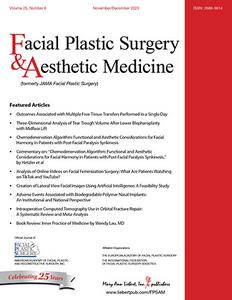image:
Journal with the primary mission of providing physicians with the most accurate and innovative information in the field of reconstructive and cosmetic facial plastic surgery.
view more
Credit: Mary Ann Liebert Inc., publishers
In a new study, artificial intelligence in the form of ChatGPT outperformed an experienced rhinoplasty surgeon in answering patients’ pre- and post-operative questions related to nose surgery. ChatGPT earned significantly higher scores in accuracy, completeness and overall quality, according to the study published in Facial Plastic Surgery & Aesthetic Medicine. Click here to read the article now.
Kay Durairaj, MDand Omer Bakerfrom Pasadena, California Dario Bertossi, MDfrom the University of Verona, Steven Dayan, MDfrom the University of Illinois at Chicago, Kian Karimi, MD, from los angeles california, Roy Kim, MD, from San Francisco, California, Sam Most, MDfrom Stanford University, Enrico Robotti, MDfrom Bergamo Italy, and Frand Rosenghaus, MD, from Mexico City, reported that ChatGPT was overwhelmingly preferred by physician responses, with raters preferring ChatGPT 80.95% of the time. Their findings are presented in the article titled “Artificial Intelligence vs. Expert Plastic Surgeon: Benchmark Study Shows ChatGPT ‘Wins’ Rhinoplasty Consultations: Should We Be Concerned?”
“Our findings showed that ChatGPT demonstrated a remarkable ability to effectively respond to a wide range of patient questions, including visual ones such as non-surgical treatment options and post-operative care instructions,” the researchers said. “In the majority of cases, ChatGPT performed at or above the level of an expert rhinoplasty surgeon.”
Facial Plastic Surgery & Aesthetic Medicine Chief editor Travis T. Tollefson, MD, MPH, The University of California, Davis states: “Online tools like ChatGPT make Artificial Intelligence (AI) or large language models (LLM) accessible to the public with such enthusiasm. To best serve our patients and the overall medical community, we must remain conscientious in the appropriate use of these technologies. It’s amazing to read AI-generated content edited in the way Hemingway or Dostoyevsky wrote. It remains our responsibility to advise patients about occasional inaccurate statements made in AI-generated content. We can both recognize that most of our patients will use AI and focus our efforts on maintaining the integrity of our patient education and counseling practices.”
About the Journal
Facial Plastic Surgery & Aesthetic Medicine is a multi-specialty, peer-reviewed journal with the primary mission of providing physicians with the most accurate and innovative information in the facial plastic and reconstructive surgery industry. Led by the editor-in-chief Travis T. Tollefson, MD, MPH, University of California, Davis, The journal publishes important peer-reviewed articles on all aspects of reconstructive and cosmetic head and neck surgery. Facial Plastic Surgery & Aesthetic Medicine is the official publication of the American Academy of Facial Plastic and Reconstructive Surgery, Inc., the European Academy of Facial Plastic Surgery, and the International Federation of Facial Plastic Surgery Societies. For more information and a sample issue, visit Facial Plastic Surgery & Aesthetic Medicine Website.
About the Publisher
Mary Ann Liebert, Inc. is a global media company dedicated to creating, curating, and delivering effective research and authoritative peer-reviewed content services to advance the fields of biotechnology and life sciences, specialty clinical medicine, and public health and policy. For complete information, please visit Mary Ann Liebert, Inc. Website.
Newspaper
Facial Plastic Surgery & Aesthetic Medicine
Research Method
Observational study
subject of research
People
Article title
‘Two is better than one’: The multifactorial nature of combination phage-antibiotic therapies against infections caused by ESCAPE
Denial of responsibility: AAAS and EurekAlert! are not responsible for the accuracy of news releases published on EurekAlert! with contributing institutions or to use any information through the EurekAlert system.


